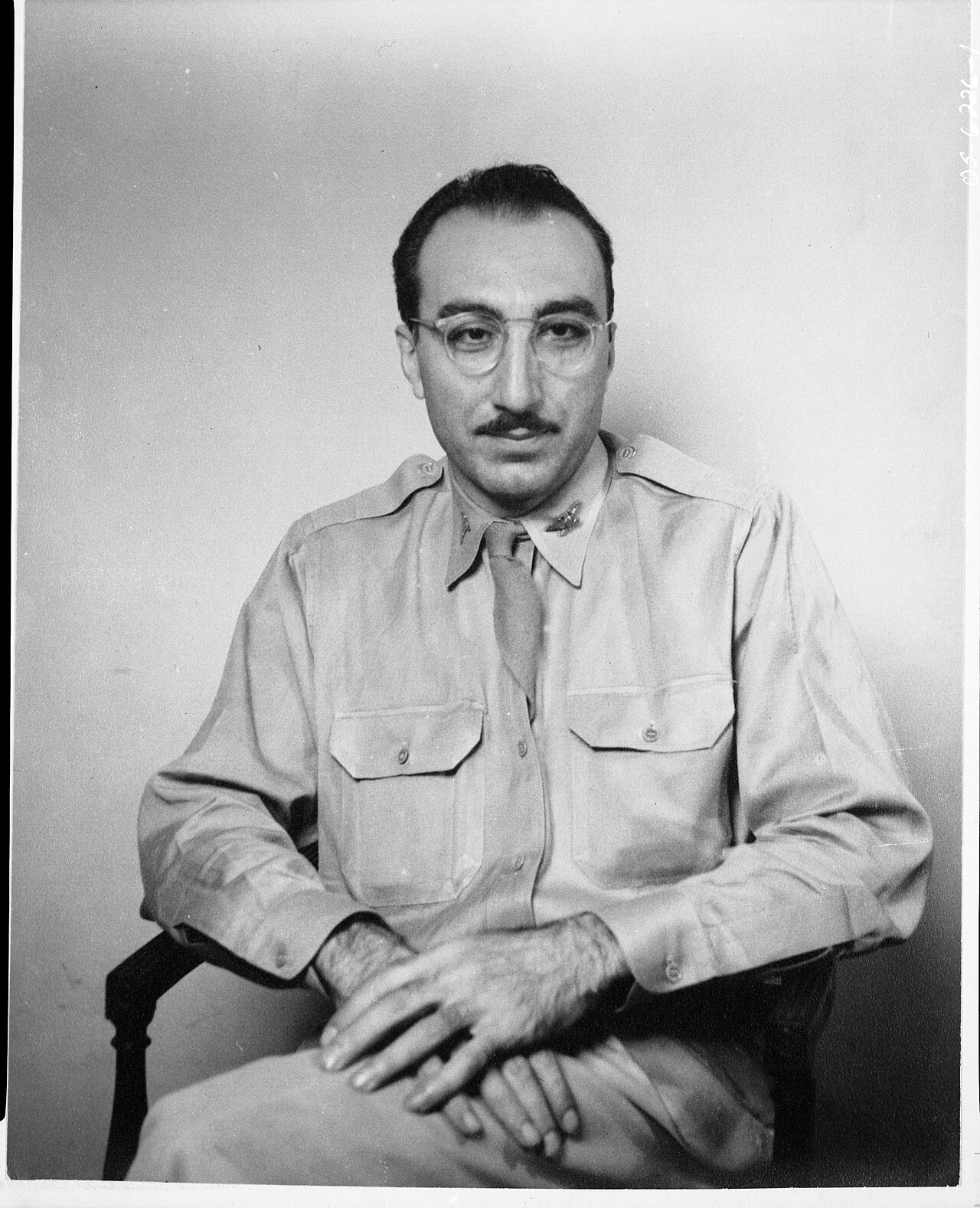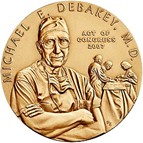Pathbreakers of Arab America—Michael DeBakey

By: John Mason / Arab America Contributing Writer
This is the eighty-seventh in Arab America’s series on American pathbreakers of Arab descent. The series features personalities from various fields, including entertainment, business, sports, science, the arts, academia, journalism, and politics. Our eighty-seventh pathbreaker is Michael DeBakey, born to Lebanese Christian immigrants in Louisiana, was a world-renowned vascular surgeon. He pioneered clinical work and research on vascular diseases, including bypass surgery and heart transplants, and led a revolution in the surgical approach to heart disease. DeBakey, who was awarded the Congressional Gold Medal in 2008, died shortly afterward at the age of 99. He is a universally admired legend.
Cardiovascular surgeon, scientist, and medical educator, DeBakey’s career spanned almost 8 decades, revolutionizing the surgical approach to heart disease
Michel Ellis Dabaghi (Arabic: ميشيل دبغي) was born on September 7, 1908, in Lake Charles, Louisiana. His name was later anglicized to DeBakey. His parents, Shiker and Raheeja Dabaghi were immigrants from Marjeyoun, Lebanon, although they did not meet until both were living in the United States. Wikipedia Series on Arab Americans describes Shiker, who had been a traveling salesman, as settling in Lake Charles in the early 1900s. He began establishing retail businesses there, particularly general stores and drugstores. Both parents spoke French. Young Michael, who helped with manual chores and keeping the books, was the eldest of six.
DeBakey enjoyed academic success as a youth and then as a medical school student. Displaying intelligence and originality, Michael came under the tutelage of surgery professor Alton Ochsner, followed by a year of training in Europe. During World War II, DeBakey was assigned to the Office of the Surgeon General of the Army, where he excelled in administration, rising to the rank of Colonel. He served in the military after the war, contributing to the foundation of postwar federal medical research and veterans’ care. In 1945, he received the Legion of Merit award for his military contributions. In 1948, he became Chair of Surgery at Baylor University Medical School in Houston. Then, the department focused on clinical and research efforts related to vascular diseases, which led to a revolution in the surgical approach to these conditions.

One of DeBakey’s early contributions to vascular disease treatment at Tulane was a version of the roller pump, which transfused blood directly from person to person. It later became a component of the heart–lung machine. His other surgical innovations included novel procedures to repair aortic aneurysms and dissections, ventricular assist devices, and the introduction of prosthetic vascular substitutes. DeBakey received many awards, including the Albert Lasker Award, the Presidential Medal of Freedom, the National Medal of Science, and the Congressional Gold Medal. With his mentor, Alton Ochsner, in 1939, DeBakey postulated a strong link between smoking and carcinoma of the lung, a hypothesis that other researchers supported as well.
DeBakey was a member of the medical advisory committee of the Hoover Commission and was chairman of the President’s Commission on Heart Disease, Cancer and Stroke during the Johnson Administration. He worked in numerous capacities to improve national and international standards of health care. Among his numerous consultative appointments, he served three terms on the National Heart, Lung, and Blood Advisory Council of the National Institutes of Health.
Our 87th Pathbreaker was among the earliest surgeons to perform coronary artery bypass surgery. A pioneer in the development of an artificial heart, he was among the first to use an external heart pump successfully in a patient – a left ventricular bypass pump. In 1958, to counteract the narrowing of an artery caused by an endarterectomy, DeBakey performed the first successful patch-graft angioplasty. DeBakey founded and chaired the Foundation for Biomedical Research, whose goal is to promote public understanding and support for animal research.

DeBakey continued to practice medicine until he died in 2008 at age 99. His contributions to the field of medicine spanned almost 75 years. DeBakey operated on more than 60,000 patients, including several heads of state. He and a team of American cardiothoracic surgeons supervised quintuple-bypass surgery performed by Russian surgeons on Russian president Boris Yeltsin in 1996. Later, DeBakey oversaw an aorta-coronary bypass surgery of Azerbaijani president Heydar Aliyev in Cleveland, Ohio, during Aliyev’s visit to the United States.
In late 2005, DeBakey himself suffered an aortic dissection. Years prior, DeBakey had pioneered the surgical treatment that now bears his name to treat this condition. Ironically, at Houston Methodist Hospital, where the diagnosis was confirmed by a CT scan, on February 9–10, DeBakey, at age 98, became the oldest patient ever to undergo surgery to repair his aorta with a Dacron graft—the very procedure he himself had invented. After some time for recovery, DeBakey was released in September 2006 and returned to good health.
DeBakey died from natural causes at Houston Methodist Hospital on July 11, 2008, at age 99. After lying in repose in Houston’s City Hall, the first ever to do so, the Co-Cathedral of the Sacred Heart held a memorial service for Dr. DeBakey on July 16, 2008. He was granted burial privileges at Arlington National Cemetery by the Secretary of the Army.
One of America’s most honored physicians, DeBakey reaped countless awards in revolutionizing heart disease surgery
The list of honors awarded to DeBakey is literally hundreds long, far too many to present here. Nevertheless, it is worthwhile to name at least some of the more important ones. Imagine, alone, he was the recipient of as many as 50 honorary college and university degrees, and in 1987, President Reagan awarded him the National Medal of Science. The United Nations awarded him its Lifetime Achievement Award, and in 2000, he was cited as a “Living Legend” by the Library of Congress. On April 23, 2008, he received the Congressional Gold Medal from President George W. Bush, Speaker of the House Nancy Pelosi and Senate Majority Leader Harry Reid. These represent a mere fraction of DeBakey’s many awards.

A 2008 Arab America column on Dr. DeBakey’s death expresses some of the poignant feelings about this remarkable Arab American who radically and positively transformed the nation’s approach to heart health. Ron Girotto, president of The Methodist Hospital System, for example, noted, “DeBakey has improved the human condition and touched the lives of generations to come.”
DeBakey, while still in medical school in 1932, as noted earlier, invented such components as the roller pump, which takes over the function of the heart and lungs during surgery. The invention was only the start of a lifetime of innovation. Girotto noted, “The surgical procedures that DeBakey developed once were the wonders of the medical world. Today, they are commonplace procedures in most hospitals.”
DeBakey was also a pioneer in the effort to develop artificial hearts and heart pumps to assist patients waiting for transplants, and helped create more than 70 surgical instruments. Dr. William T. Butler, a colleague of DeBakey’s at Baylor, said in March 2006 that DeBakey established himself with his surgical firsts as the “maestro of cardiovascular surgery. He was never afraid to challenge the status quo, often going against the tide. Sometimes his colleagues did not accept his visionary ideas, particularly as he propelled beyond the boundaries of existing scientific dogma.”
Arab America reported DeBakey as claiming, “I always knew I wanted to be a doctor. I just didn’t know what kind.” He recalled in 1999 that by the time he finished medical school in 1932, “there was virtually nothing you could do for heart disease. If a patient came in with a heart attack, it was up to God.”
DeBakey changed all that! What a legend and the pride of Arab Americans, and for that matter, all Americans.
Sources:
“Michael DeBakey,” Wikipedia Series on Arab Americans, 2025
“Michael E. DeBakey, M.D.–Legacy of Excellence,” Baylor College of Medicine, no date
“A Time for All Things: The Life of Michael E. DeBakey,” Craig A. Miller, 11/2019
“Renowned Lebanese American Heart Surgeon Dr. Michael DeBakey Dead at 99,” Arab America, 7/12/2008
John Mason, Ph.D., focuses on Arab culture, society, and history and is the author of LEFT-HANDED IN AN ISLAMIC WORLD: An Anthropologist’s Journey into the Middle East, New Academia Publishing, 2017. He has taught at the University of Libya, Benghazi, Rennselaer Polytechnic Institute in New York, and the American University in Cairo; John served with the United Nations in Tripoli, Libya, and consulted extensively on socioeconomic and political development for USAID and the World Bank in 65 countries.
The views and opinions expressed in this article are those of the author and do not necessarily reflect the position of Arab America. The reproduction of this article is permissible with proper credit to Arab America and the author.
Want more articles like this? Sign up for our e-newsletter!
Check out our blog here!








